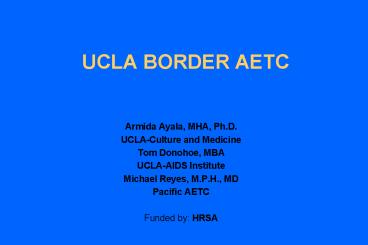UCLA BORDER AETC - PowerPoint PPT Presentation
1 / 6
Title:
UCLA BORDER AETC
Description:
... planning process to assess the feasibility of creating a US/Mexico border AETC. ... to further assess training and education needs and resources along the border. ... – PowerPoint PPT presentation
Number of Views:39
Avg rating:3.0/5.0
Title: UCLA BORDER AETC
1
UCLA BORDER AETC
- Armida Ayala, MHA, Ph.D.
- UCLA-Culture and Medicine
- Tom Donohoe, MBA
- UCLA-AIDS Institute
- Michael Reyes, M.P.H., MD
- Pacific AETC
- Funded by HRSA
2
Background
- UCLA Pacific AETC to conduct a five-month
planning process to assess the feasibility of
creating a US/Mexico border AETC. - Planning process includes executive committee and
working group participation from Arizona,
California, New Mexico and Texas. - Data gathered to assess the diverse training and
education needs of service providers in the
US/Mexico border.
3
Method
- Literature review
- Data inventories
- Focus groups
- Key participant interviews.
4
Time Line
- TASK DUE
- Executive Committee and Working Group 11/30/01
- Conference calls Ongoing
- Data Collection 12/01-02/02
- Data Synthesis 02/25/02
- LA Meeting 02/28-03/01/02
- Report Preparation 03/15/02
- Report Submission to HRSA 03/30/01
5
Discussion Items
- Is there a need for a border AETC to address
HIV/AIDS training and education issues among
border service providers? - What is each state doing locally to assess
training and education needs of HIV/AIDS
providers and initiate training strategies along
the border (I.e., internet training, distance
learning, cross border training)? - What data would you collect to assess HIV/AIDS
providers training needs along the border? Who
would you target as possible respondents to get
this information?
6
Limitations
- The findings from this study will not be
generalized to all HIV/AIDS service providers
along the border because they are limited to a
formative approach. - Data from Mexican HIV/AIDS providers are needed
to further assess training and education needs
and resources along the border.































